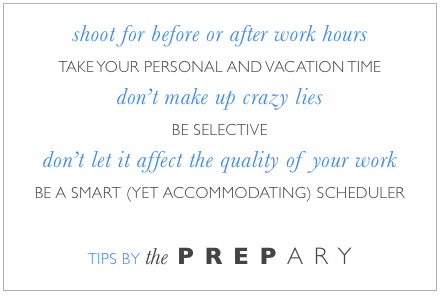People like to say “looking for a new job is a full time job” yet the “optimal” situation to be in is to look for a job while you already have one. However, there is one thing that is not optimal about that – finding a way to get out of work to interview!
Here are a few tips…
I’ve only switched jobs once, and this was hands down my least favorite part about the process. As someone who barely ever takes a sick day, personal day, or goes to the doctor (I avoid this activity at all costs!) I was nervous it would be blatantly obvious if I started using those excuses. I hate being dishonest, so I had to find some other ways. It’s not an easy process, but here are a few thoughts to make it as painless as possible (realistically, your approach will probably end up being a combination of points 1-4).
1. Shoot for early mornings/late afternoons/lunch time – There is nothing wrong with letting your scheduler know that you are working full time and therefore would prefer to interview in the morning or late afternoon. However, remember to always come across as flexible and accommodating. The best way to express this is by saying “My schedule can get a bit busy at work so if at all possible early morning, lunch time, or late afternoon would be best for me. If not, I am happy to work around your schedule so let me know what works on your end.” You’ll find that it is easier to come in late or leave work early (vs. taking a few hours in the middle of the day) and if you are really lucky maybe you can even schedule your interview early enough or late enough for it not to interfere with your regular work day at all.
2. Use your personal or vacation days – You likely have personal days and vacation days that you haven’t yet used. When you take either type of time off, you are not at all obligated to explain why (nor should your employer ask). Give some advanced notice (at least a few days) if you are going to take this approach. If you do this, you can let your scheduler know that you plan on taking the day off to make it to the interview so if there is more than one person you may need to meet, you can make yourself available (again, give the information without coming across as demanding or presumptuous – it’s all about tone). Keep in mind, meeting multiple people in one day would more likely happen in the 2nd or 3rd round (vs. the 1st).
3. Only apply and interview at places you really want to work – When unemployed, I think it can be ok to explore different opportunities and interview with companies that you don’t feel that strongly about (check out this post on “casting a wide net”). However, if you are working full time, I think it’s important to only spend time in the interview process with companies you are really excited about. You have the opportunity to be picky… so don’t settle! As hard as it is to make the time to go through 1 or 2 interview processes, it will be almost impossible to juggle more than that.
4. The “excuses” – This is not at all my favorite strategy but sometimes you do need to make up an excuse to be out of the office for a few hours in the middle of the day. People tend to use “doctors appointments”, “cable guy is coming”, etc. If you feel like this is the only option, I guess sometimes you may need to go here. I don’t love this approach, but I will say it is pretty common. Keep in mind that the interview process can be a few rounds (sometimes up to 3 visits to a company) so you it’s probably unrealistic that you can say you are going to the doctor multiple times without people worrying that you are actually very sick! Absolutely do not use more serious excuses (i.e. death in the family or anything else that is more severe). That is a definite no.
5. Honesty – Generally, honesty may not be option. However, there are some situations where you probably can be honest about your search for a new role. For example, if you found out you are going to be laid off in a certain amount of time, if your company is going out of business, or if the company is moving to a new location and you are not relocatable, it is pretty reasonable you might be looking elsewhere. Your team would probably understand that. In general though, you want your current employer to feel that you are a dedicated employee and informing them of another job search won’t help your case.
6. Watch out for what your outfit might imply – If the dress code of your office differs from the dress code of the place you are interviewing, you may need to be careful of what your outfit can imply. If you work in a business casual environment, are wearing a suit, and have a “doctors appointment”, people are going to be able to add it up pretty quickly. Just be aware of this and you may need to find creative ways to change “on the go”.
7. Don’t let it interfere with your quality of work – At the end of the day, your number one priority is to make sure you are getting your work done. Don’t run out for an interview leaving “loose ends” or during your busiest times of the year. Leaving in the middle of a quiet day after you’ve finished all of your tasks is a lot more acceptable as leaving when things are crazy and others are forced to “pick up the slack”.
Ultimately, it’s a less than ideal situation but “it is what it is”. Everyone you work with has probably had to go through this at one point or another. However, you don’t want to burn bridges with your company on your way out so the best approach is to use your personal days, schedule interviews early/late if possible, make sure your quality of work isn’t sacrificed, and avoid lying as much as possible.








